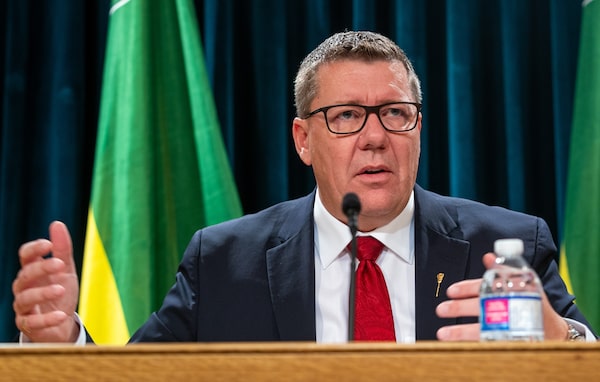
Saskatchewan Premier Scott Moe speaks during a press conference in Regina, on Oct. 25.Heywood Yu/The Canadian Press
There was a time when Scott Moe was quite keen on the rule of law. Four years ago, when activists blockaded rail lines across the country to protest the construction of a pipeline in the B.C. interior, the Saskatchewan Premier publicly demanded that the “rule of law” be upheld, calling it a “fundamental pillar of democracy.”
But now that it no longer serves his political interests, he’s not so sure. The Premier has ordered the province’s energy utility, SaskEnergy, to stop collecting the carbon tax on the natural gas most Saskatchewanians use to heat their homes (a similar edict applies to the province’s electrical utility) as of Jan. 1. Mr. Moe acknowledges the move is a “violation” of federal law, which he calls “unfortunate.”
But, well, the political heart has its reasons. The move is a response, he says, to the federal government’s decision last fall to exempt home heating oil from the tax, a decision that benefited many Atlantic Canadian households (and many more outside Atlantic Canada) but not those in Saskatchewan. Mr. Moe and his ministers portray this not so much as a protest, but as a logical consequence of the federal decision.
“On Jan. 1,” the Premier tweeted on Nov. 30, “we’re taking the Trudeau-NDP carbon tax off natural gas for home heating to match the federal exemption for heating oil.” The province, Mr. Moe told a year-end interviewer, was “making the very same decision on behalf of its residents as the federal government did on behalf of residents in Atlantic Canada.”
There’s just one difference, and I’m sure you’ve spotted it: the federal government has constitutional authority to decide to whom or what the federal carbon tax should apply. The province does not. Neither does SaskEnergy, whose executives face potential fines or even jail time under federal law if they fail to remit the tax.
The Premier has an answer to that, too. Bill 151, passed last month, purports to shield the utility’s executives from legal action, by 1) registering the provincial government, rather than SaskEnergy, as the province’s natural gas distributor, 2) indemnifying the executives for any fines or legal costs they might incur and 3) declaring that “no action or proceeding may be commenced” against them for any action they might take or not take at the government’s behest – such as not collecting the carbon tax.
Well no, that’s not how the rule of law works, either. A province cannot simply pass a law excusing its employees from the application of federal law. Not even Danielle Smith has been willing to go that far – her first use of the flagrantly unconstitutional Alberta Sovereignty Act stopped short of countenancing overt lawbreaking – though she continues to threaten to.
We have reached, in short, a dangerous new turn in the current epidemic of provincial lawlessness – not only in Saskatchewan and Alberta, but in Quebec (Bills 21 and 96, both backed by the pre-emptive use of the notwithstanding clause) and Ontario (whose own repeated recourse to the clause, on the flimsiest of pretexts, has set new standards for uncouth expedience).
Things will apparently not come to a head in Saskatchewan until the end of February, when January’s carbon tax collections are due to be sent to Ottawa. Meantime Mr. Moe’s government is demanding Ottawa incorporate its distributor switcheroo in its own regulations – in hopes, it appears, that it can arrange for the responsible provincial cabinet minister, Dustin Duncan, to face prosecution, rather than the utility executives.
Unhappily for Mr. Duncan’s ambitions of martyrdom – he has declared his readiness to go to “carbon jail” if necessary – the decision on whom, if anyone, to charge is not up to Justin Trudeau, but rather the Public Prosecution Service of Canada (whose independence Mr. Trudeau may be rather more inclined to respect in the present instance than in the matter of SNC Lavalin).
Still, the broader question – what to do with provinces that openly defy the Constitution – is hanging in the air. The provincial leaders in question bear full responsibility for having brought things to such a pass. But the horse having bolted, it falls to the feds to return it to the barn.
For now, the Moe government’s silliness is the most urgent priority. That is not to suggest any hasty or extreme action is warranted. A reference to the Supreme Court on the constitutionality of Bill 151 might be clarifying, and would buy time. Perhaps some non-legal sanction – the provinces depend on federal co-operation, not to say federal cash, in any number of fields – might be deployed.
But sooner or later the other provincial revolutionaries will have to be confronted, as well. Not only is the constitutional order of the country under challenge. The very rule of law is at stake.